#“i agree that the genocide is bad” and yet you refuse to focus on fighting to stop the genocide and focus on bullshit
Explore tagged Tumblr posts
Text
hey israel lovers why r you arguing so desperately the semantics of what an ethnostate is and who the land belongs to when we all fucking know that killing people is Bad
#hey why r we still talking about the terrorist organization because last time i checked terrorists attacks aren't a justification to kill an#entire race of people#“i agree that the genocide is bad” and yet you refuse to focus on fighting to stop the genocide and focus on bullshit#you guys can try to argue about politics and religion once israel isn't KILLING AN ENTIRE COUNTRY ANYMORE#mumblings//#it's so funny bc I read the posts and I'm like maybe I'm wrong. maybe they're right. and then I remember literally nothing they fucking say#will justify the genocide#even if somehow the land did magically belong to them for some fucking reason it still doesn't justifies killing everyone#even if palestine was full of bigoted asshole that still is not a justification for GENOCIDE ARE YOU HEARING YOURSELVES#holy fuck what is wrong with these people
9 notes
·
View notes
Note
Tbh let's just say for a second that ironwood is actually a murderous genocidal fascist evil human being who never cared about anyone at all but himself and the relic (which is definitely not true at all LMAO let me just make that clear), that still doesn't make team rwby's plan any less bad, dangerous, and naive?
Like, man, I can't help to feel like this is what the writers want us to do. Argue all the time about whether ironwood is a big bad evil man compared to team rwby so we don't even think that, on its own, team RWBY made a fucked up decision for literally everyone else. Like if ironwood didn't even exist, or just went along with everything they said, it still would be shitty! And not only did they do that, their hazardous plan was supposed to resolve itself through "trust love uwu" (plot contrivances out the ass) but they couldn't even manage to do that either because team RWBY, frankly, are just not nice people to anyone outside their in group. Did the power of friendship make them refuse to go to the front lines and help fight the grimm alongside the soldiers they help put there? Did it make them threaten and shame an abused 14 year old into doing all their work for them only for them to take all the credit in the end? Hell, even that stupid minor joke of Nora pressing all the buttons in the elevator to inconvenience those two soldiers (probably on their way to die on the battlefield because of team RWBY) was just meanspirited as fuck and not at all funny. Etc, etc.
Tdlr: RWBY fans need ironwood to be a big bad fascist evil dictator because when you look at team rwbys actions on it's own you realize that they're shitty people. But hey, at least they didn't randomly threaten to bomb innocent civilians!/s
That's the thing isn't it? People will hiss and scream about how evil and vile James is but refuse to discuss at all RWBY's actions at all really. Or if they do they just say something like "Well you're wrong" and leave it at that, pretending as if that is a good argument to the issues and flaws people point out. Like someone will point out how in Volume 8 how disrespectful and controlling it was of Ruby to take Penny's scroll to respond to James's call and how it wasn't right to not let Penny respond on her own. Rather then discuss that part of the conversation people will redirect and argue that James was trying to use Penny but...that's not the point of the argument, the point is what RUBY is doing is messed up, James wasn't part of the issue and just happened to be their in a sense. So long way of saying I agree Anon. It does feel like all CRWBY wants is for everyone to be arguing so we don't focus on the bigger picture.
But back to the point. The easiest way for people to deflect criticism is to start pointing fingers somewhere else. Ruby sits around the mansion drinking tea, we point out that's kind of fucked? "Oh so you think James bombing people is okay?" No that's not the point, the point was about RUBY and HER choices not James. He is not relevant to the topic of Ruby sat around a mansion drinking tea and didn't even try to help the soldiers she trapped on the front lines NOR the civilians she claimed to care so much about that she had to sentence the soldiers to death. Or when we point out how fucked it is that Weiss pointed a loaded weapon at an unarmed child to force her way inside a home she was not welcome to enter into they scream "James was after them they had no choice!" or "Nora was hurt they had no choice!" I will admit, I didn't really think about the elevator scene until now but....fuck you're right. Just the added layer of knowing they're about to go out into a fight where they know they will likely die and Nora still decided to further fuck with them at their expense is just.....yikes all around. Being cruel for the sake of it is just not something you should ever be cheering your main characters for doing. And yet the mega fans will laugh at the soldiers expense even if it comes out later that they did in fact die in the battle they went into. They don't want to actually examine the shit the mains pull and would rather point fingers elsewhere then face the music that their precious faves are actually shitty people and that is just not okay.
But as you said, at least they're not a mustache twirling villain right? No need to examine them and their actions any further cuz they're better then James and that's all that matters right?
#RWDE#rwby bashing#rwby critical#ironwood protection squad#james ironwood#pro james ironwood#pro ironwood#general dadmiral#general ironwood
20 notes
·
View notes
Text
“Invincible”, Season 1 (2021) Review

Somehow both very cool and very fucking stupid :D
About Created and written primarily by Robert Kirkman (principle writer for The Walking Dead comic and TV show), this Young Adult cartoon basically synthesizes a number of comic book characters (e.g., Superman, Batman, Green Lantern, Hellboy, Wonder Woman, Gambit) and tries to balance their heroism with cynical twists and dark realities. It's an exercise like Brightburn (2019) in that it mirrors existing comic writing all too closely in order to make violent twists. The cool stuff arrives pretty much immediately. You can tell right away that the physics have some level of realism, and it quickly gets serious because of this. The easy comparison would be to The Boys (also by Amazon, also about violent heroes, and also very well-produced). So, if you like The Boys (2019–), you'll probably like Invincible only a little less.
(( Some spoilers but nothing too specific ))
Wrong Focus But, the stupid stuff comes from the same error that the Kick-Ass movie (2010) made: it focuses on the wrong person(s). In Kick-Ass, the error was focusing on.. well.. "Kick-Ass", an irredeemable loser and waste of screen time. Invincible makes the same mistake, focusing on.. well.. "Invincible", a (so far) irredeemable loser and waste of screen time. So, despite its virtues, this show cannot escape that it made the decision to go for the Young Adult viewing demographic. It reminds me of Alita: Battle Angel (2019) in that way too: some very cool adult concepts ruined by the dramatic devices of unrepentant teenage stupidity and irrelevance. I didn't even like that stuff when I was a teenager, though Jordan Catalano gets a pass.
Main Cast and Characters The supporting characters were also very stupid. The most annoying was definitely Amber Bennett (voiced by the otherwise cool Zazie Beetz from Deadpool 2 (2018) and Joker (2019)),

who is supposed to be attractive somehow to Mark Grayson ("Invincible", voiced by Steven Yeun, who played Glenn on The Walking Dead)

despite the fact that she constantly judges him, fails to understand him, often fails to give him any kind of benefit of the doubt, and continues to scowl at him and be hurtful towards him even when she has information that should change her outlook towards him. And because she is part of the love triangle shared between herself, Invincible/Mark, and "Atom Eve"/Samantha (voiced by the awesome Gillian Jacobs from Community (2009–2014)),

audiences simply have to bear with it that Amber's annoying character will be present and wasting time until Mark can realize that Amber is in fact toxic and that Eve actually understands him and can improve him in more positive directions. That love triangle should have been a 20-minute distraction, but I'm guessing that it will eat up a season or two more, especially if the writers become cowardly and fail to change things for fear of messing up a perceived "winning" formula. In my ideal story line, they would skip ahead 10 years, drop the teen drama, the love triangle, and the stupid jokes and have Invincible and Eve paired in defense of Earth, with the main tension being from their worry that the other would be horribly gored in front of them during lethal fights against cosmic enemies ;)
Aside, I am aware of Amber’s motivation for being a bad person, I just think her justification is not based in understanding, empathy, and a regard for the gravity of Invincible’s situation. In a strict political sense, Invincible should not commit a lie of omission by keeping her in the dark about his identity — even if for the “noble lie” reason of protecting her — but in a real sense, he is a fucking teenager who just developed his super powers. For her to pretend that he should reveal his entire identity to her — a potentially transformative and even dangerous decision — after a few months of teenage romance paints an absurd portrait of her mind. It does, however, align her with Omni-Man, because where Omni-Man forces Invincible to become an adult in the fighting sense (pushing with full force early on), Amber forces Invincible to become an emotional adult by getting him to understand that toxic people such as herself need to be given boundaries — and he needs to learn to clearly delineate and communicate his real desires. By knowing that he does not want Amber, people who regiment his free time, or people who do not suit him, for instance, he can realize why Eve was an obvious decision: Eve understands, can make time when they have time, and will let him find his decisions. Part of a coming-of-age story tends to be realizing what one actually wants, and Invincible’s hesitation in telling Amber his identity shows that he does not truly want her. This separates Invincible from, say, Spider-Man, who avoided telling Mary Jane his identity not because he did not want her but because he wanted at all costs to protect her.
The next most annoying character has to be Debbie Grayson (voiced by TV-cancer Sandra Oh and who luckily was not animated to look like the real Sandra Oh and who should have been voiced instead by Bobby Lee due to Lee's successful MadTV parody of Sandra Oh).

Debbie basically fills the role of Skyler in Breaking Bad, except that Debbie's character tends to be slightly more understanding before her inevitable and toxic Skyler-resentment and undermining behavior. Despite having an 8-episode arc of change, Debbie's character flips too quickly and lacks the empathy and Omni-Man motive-justifying that would make her interesting (the comic's development may vary). For instance, if she refused to believe that Omni-Man meant his own words, that would make her empathetic and perhaps virtuous even if misled, but instead she dropped their "20 years" of understanding after viewing Omni-Man in action, which makes her appear shallow, easily manipulated, and unsympathetic. That was a definite "Young Adult" genre move because it shows immaturity by the writers to break apart a bond of 20 years so quickly. Mediocre teens might accept such a fissure because their lives have not yet seen or may not comprehend that level of time, but adults know that even long-standing and problematic relationships (which, beyond the lie, Omni-Man's and Debbie's was not shown to be) take a lot of time to break — even with lies exposed.
Omni-Man The biggest show strength for me was of course Omni-Man, who in a success of casting was voiced by J.K. Simmons in a kind of reprisal of Simmons' role as Fletcher from Whiplash (2014).
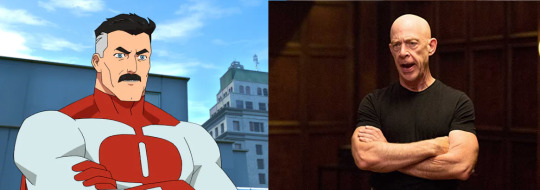
The Fletcher/Omni-Man parallel shows through their being incredibly harsh but extremely disciplined and principled, forcing people to become beyond even their own ideal selves (this via Omni-Man's tough-love teaching of Invincible — comically, Omni-Man was actually psychologically easier on Invincible than Fletcher was on Whiplash's Andrew character). Despite the show's attempts to villainize Omni-Man, he, like Fletcher and also like Breaking Bad's Walter White, becomes progressively more awesome, eventually representing a Spartan will, an unconquerable drive, and a realistic and martial understanding of a hero's role.
To the show's credit, while it wrote Omni-Man to be outright genocidal and from a culture of eugenicists (again, Spartan), they could not help but admire him and his "violence" and "naked force" (for a Starship Troopers reference), giving him a path to redemption. That redemption comes in part because — despite the show's attempt to be often realistic and violent — its decision to be directed at young adults via dumb jokes, petty relationship drama, the characters’ reckless lack of anonymity and security in their neighborhood (loudly taking off and landing right at the doorstep), and light indy music also made the portrayed violence far less literal. With a less literal violence, the real statement becomes not that Omni-Man really did kill so many people (though he certainly did kill those people within the show's plot) but that he was symbolically capable of terrible violence but could be reformed for good. That's the shortcoming with putting violence under demographic limitations. If it's a PG-13 Godzilla knocking down cities, the deaths in the many fallen skyscrapers don't matter so much (the audience will even forgive Godzilla for mass death if it happens mostly in removed spectacle), whereas if it's Cormac McCarthy envisioning a very realistic fiction, every death rides the edge of true trauma.
By showing light between the real and the symbolic, it is much easier to identify and agree with Omni-Man. For instance, when Robot (voiced by Zachary Quinto of Heroes and the newer Star Trek movies)
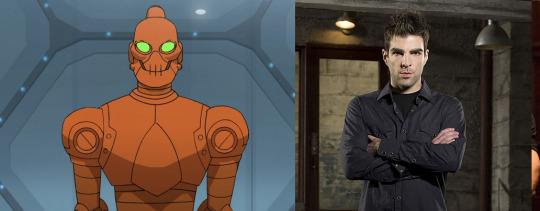
shows too much empathy for the revealed weakness of "Monster Girl" (voiced by Grey Griffin), the audience may have thought, "Pathetic," even before Omni-Man himself said it. And this because Omni-Man knows that true and powerful enemies (including himself) will not hesitate to use ultra-violence against these avenues of weakness. "Invincible" can make his Spider-Man quips while in lethal battles, but he does so while riding the edge of death — something that Omni-Man has to teach Invincible by riding him to the brink of his own.
Other Cast/Characters and Amazon's Hidden Budget It was impressive how many big-name actors were thrown into this — a true hemorrhage of producer funding. Amazon has so far hidden the budget numbers, perhaps because they don't want people to know that the show (like many of its shows) represents a kind of loss-leader to jump-start its entertainment brand.
Aside from those already mentioned, the show borrows a number of actors from The Walking Dead (WD), including.. • Chad L. Coleman ("Martian Man"; "Tyreese" on WD),

• Khary Payton ("Black Samson"; "Ezekiel" on WD),

• Ross Marquand (several characters; "Aaron" on WD)

• Lauren Cohan ("War Woman"; "Maggie" on WD)
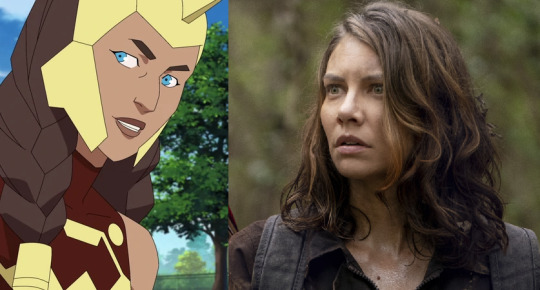
• Michael Cudlitz ("Red Rush"; "Abraham" on WD)
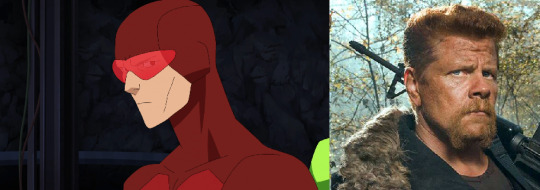
• Lennie James ("Darkwing"; "Morgan" on WD)
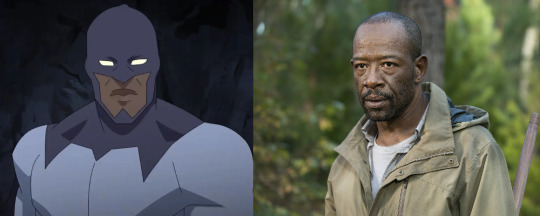
• Sonequa Martin-Green ("Green Ghost"; "Sasha" on WD)

There were also connections to Rick and Morty and Community, not just with Gillian Jacobs but also with... • Justin Roiland ("Doug Cheston"), who voices both Rick and Morty in Rick and Morty,

• Jason Mantzoukas ("Rex"),

• Walton Goggins ("Cecil"),
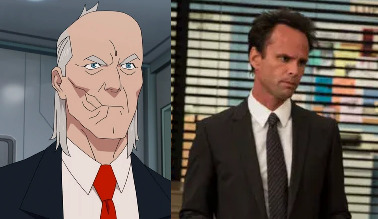
• Chris Diamantopoulos (several characters),

• Clancy Brown ("Damien Darkblood"),
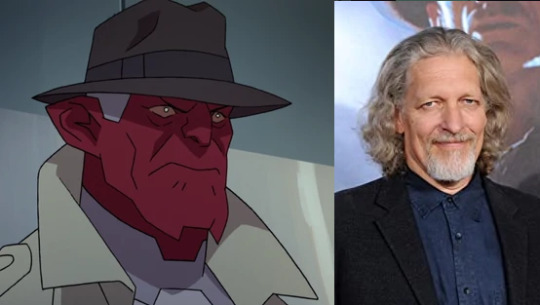
• Kevin Michael Richardson ("Mauler Twins"), and

• Ryan Ridley (writing)
That's a lot of overlap. They even had Michael Dorn from Star Trek: TNG (1987–1994) (there he played Worf) and Reginald VelJohnson from Family Matters (1989–1998) and Die Hard (1988), and even Mark Hamill. Pretty much everyone in the voice cast was significant and known. Maybe Amazon got a discount for COVID since the actors could all do voice-work from home? ;)
Overall Bad that it was for the Young Adult target demo but good for the infrequent adult themes and ultra-violence. Very high production value and a good watch for those who like dark superhero stories. I have heard that the comic gets progressively darker, which fits for Robert Kirkman, so it will likely be worth keeping up with this show.
24 notes
·
View notes
Text
Just randomly reviewing scenes from the movies no one remembers now. This week: Avatar (2009).
It’s not like everyone forgot James Cameron’s Avatar. Since we’re still getting some footage from behind the scenes of the sequel and news about the cast, at least someone takes pains to remind themselves of this cinematic experience from the year of 2009. It’s already been 84 (just kidding, 11) years and I’m still looking forward to at least watching the teaser (fun fact: I was 11 when Avatar came out, I’m 22 now). I even bought the Darkhorse comic book on Tsu’Tey’s backstory to, you know, investigate one of my favorite characters a little bit better (spoiler: the backstory wasn’t very much eventful but I noticed a nice detail there which I may talk about briefly a bit later).
Throughout the years Avatar has received a lot of backlash and more or less justified criticism, mainly for the plot and its problematic packaging. I believe, it depends on the perspective one watches a movie from. Of course, I wouldn’t call it an absolute gem of exciting storytelling, even though I truly enjoy it, as in majority its twists are undeniably predictable. However, I always disagreed with people saying relations in Avatar aren’t deep at all. Well, romance between Jake and Neytiri, which, let’s be honest, except for the scene of telling the truth, went too smoothly, and this is why I strongly believe clash of interests is inevitable in sequels. Their interaction remained the key one for the whole movie, and nothing is bad about that, people enjoy a nice lovestory, so do I. But 11 years after I’d like to focus on the disturbing conflict everyone prefers to ignore for some reason when recalling Avatar. For me it’s always been Jake versus Colonel Quaritch.
You guys may have already guessed which scenes I wanna talk about. Those really important ones that I consider climactic to the pace of narration. And what is more about them, they give us crucial details in character development and actors’ play to think through. The main message: Quaritch knew it was coming.
Let me firstly touch upon the scene of short conversation between Jake and Quaritch prior to Sully presumably leaving Pandora. While Jake is awating Quaritch in a large empty hall, he hardly seems to be calm about the talk, every nerve in his body is trembling, but why?
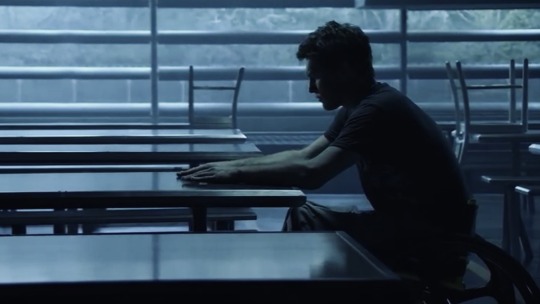
The way Jake’s drumming his fingers on the table makes me wonder if he’s okay.
Then Colonel enters the hall, grabs a chair and reminds that it had been more than two weeks since he got the latest report on how the misson was going. He knows, Sully is questioning reality, and no, he’s not ‘doubting his resolve’. He knows, the right moment to ‘terminate the mission’ is missed. He knows, he lost Jake. He knows, he’s talking to the deserter. Yet Quaritch speaks indifferent. He praises Jake’s effort and rewards him for that. With real legs he promised to him when they first talked. Quaritch hoped they’d trigger the realization in Jake. Which doesn’t happen. How sad he looks when Jake openly refuses to accept the reward.

In just one sequence Stephen’s face demonstrates the shift of all four feelings Quaritch goes through: dissatisfaction, melancholy, shame, disgust.
Quaritch sensed the moment when Jake expressed superiority to the mankind. Jake grasped that Quaritch knew everything, he played with fire, and that’s why he felt anxiety. And it lasted all the way until Quaritch stepped back for leaving the hall. But did Colonel really surrender? I doubt that.
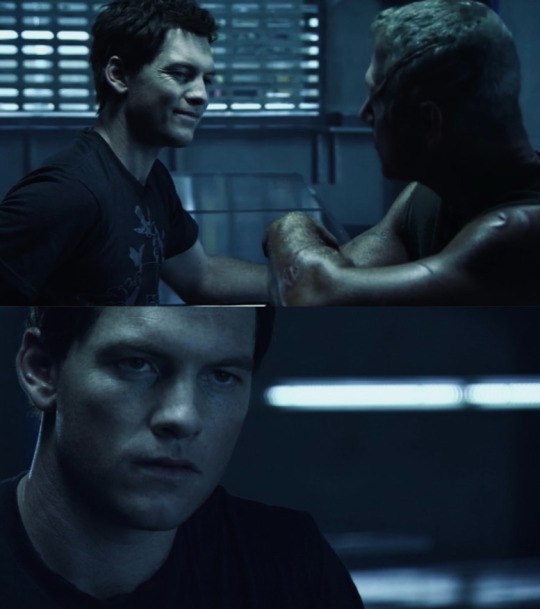
The tension between them both feels electric, so it’s explainable why Jake’s transient smile is so awkward. Sam then heavily staring straight at Colonel's back suggests that up until now Jake regarded Quaritch as his enemy. The enemy he knew he would not be able to defeat.
I remember when watching this scene, I couldn’t get myself the answer to one question. The question was: which report did Quaritch refer to? ‘That report from two weeks ago’, but such information wasn’t satisfactory for me. To be honest, this small discovery became the actual reason why I decided to type this study. Let’s assume that this particular report which Quaritch mentioned was the videolog where Jake confessed that Omaticaya wouldn’t leave the Hometree. Here’s why.
The general audience is used to perceiving Quaritch as a cruel short-tempered military man who just waits for the starting pistol’s shot to destroy everything in sight. Again, nothing is wrong about this, the fact that his character was simply meant to be a generic personification of such type doesn’t leave us with any alternative impression of him. Let’s say, if he was given the order to ignite the operation of the Hometree’s destruction to screw the tribe out of the site, he would absolutely go for it (and so he does). He’s a man of his word after all. Let’s also say, if he was pissed off by Jake’s betrayal, he would transport himself to the mountain site in a blink of an eye, turn off the link and put Jake in jail right after the talk in the hall. Instead, Quaritch decided to wait and give Jake the last chance. Jake preffered unearthly wings to those more tangible, so Quaritch chose not to cut them so abruptly.
We’re moving to the next scene, taking place right before a toned down fight between Tsu’Tey and Jake (I’m saying so, because it’s actually one of the deleted scenes that got edited out of the final cut, and believe me, the pressure between two rivals there is way too intense). Quaritch is watching the record of Jake destroying bulldozer’s lenses with a stone. After that Jake’s face is zoomed and we watch Selfridge get frustrated, Quaritch looks pretty annoyed as well but doesn’t seem to be much surprised. What he’s feeling, is bitter disappointment in himself and knowing that he totally failed to persuade Jake to change his mind.
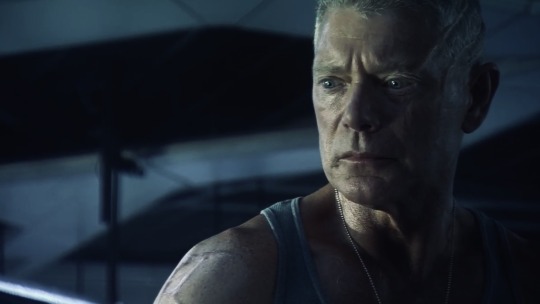
Just observe Stephen Lang’s performance here. He absolutely nails cold-eyed look, the fire burning slow inside of him is so palpable, and guess what, in a flash he flies off the handle.
Now, shall we check the ultimate scene, preceding the destruction of the Hometree. Though Grace versus Parker juxtaposition is central to this scene, the last time Quaritch confronting Jake face to face in his human body is essential to consider for making things clear.
When it comes to revealing to Selfridge the vainness of further negotiations with Omaticaya, isn’t it just interesting how fast Quaritch manages to find the correct videolog? It literally takes him not more than a couple of swipes to produce the proof. Here is why: he’s already watched the record and is completely aware of the Jake’s values having deteriorated.
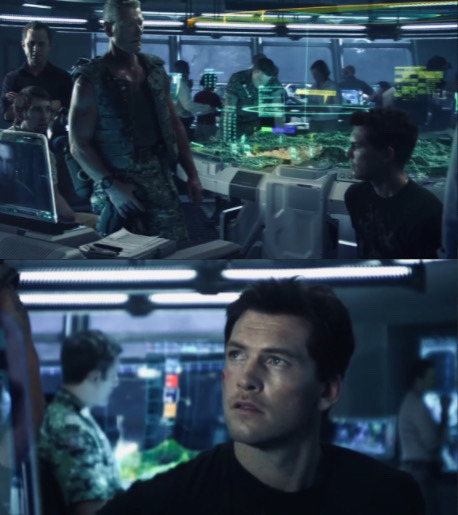
You can tell, Jake knew he was under control, but he would rather like to ingnore this fact. His pathetic glance at Quaritch, who’s almost impending above his head, causes to think Jake would guess that Colonel could have watched this videolog. Rather, it was a mutual secret between the two of them until a turning point. But the moment of truth came, and Jake didn’t change his mind. Quaritch made sure of that and finally it was his time to triumph.
So how was it even possible to assume Quaritch may have watched the videolog I’ve been talking about for so long? Well, my explanation may be too easy to believe, but still: we can tell by Jake’s appearance and the date of the record that it is the vlog we need.
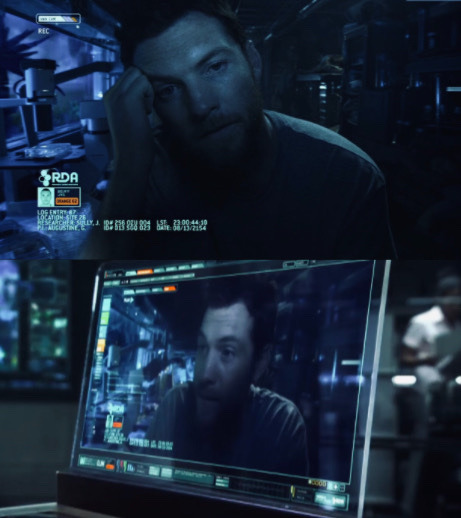
This telltale videolog was recorded 16 minutes after the another one, when Jake says that he’s uncertain, who he is anymore (LST abbreviation stands for Local Standard Time). Jake might have suddenly felt depressed and hopeless and got back to the camera while being too emotionally instable, and so must have forgotten to delete the final record.
I have one more note for you. If you check the videolog library Quaritch is swiping through, you’ll see that the latest important record, which he actually needs, is made in the interior of the mountain site block and dates back to August, 13. Other recent vlogs’ covers look nothing like Site 26 sequence. Jake may not have done any of these records at the mountain site. I still wonder though where those three or four ensuing videologs were recorded, the location seems to be red lighted, which means it isn’t blue lighting at Site 26. I may even assume he recorded some pieces at Hell’s Gate. Why would I think so? Probably because in those two scenes (dialog with Quaritch and confession at Parker’s office) Jake looks ten times better than before, he gained some weight at least and doesn’t resemble a living sceleton.
Selfridge gave Jake an hour to relocate the tribe, while gunships led by Colonel’s Dragon were already on full alert. Quaritch had no doubt that Jake’s peacekeeping mission would fail. He knew it from the beginning. Hence he sounds so sarcastic seeing Sully’s avatar tied.
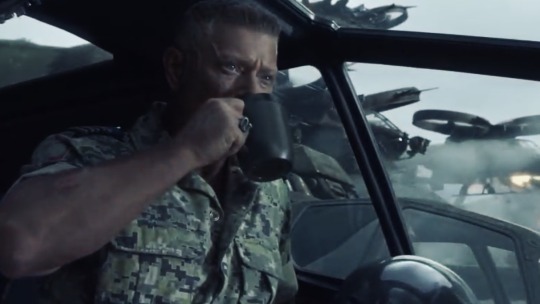
Now Quaritch sipping his villain’s morning coffee tasting like fresh genocide doesn’t feel so cringy: he’s celebrating his victory over Jake (still I should agree with critisism on this point, it really is a stupid cliche and wasn’t intended to carry a deep meaning).
Now I should admit, it’s been a long journey to run this investigation and bring it to light by finally posting it. It took me around a day to collect my thoughts and express them by means of more or less readable English. Just would like to make a little side note: English is not my native, so I promise I did my best! Thanks to James Cameron for making a movie, which woke me up in the middle of the night to start reflecting, and to all the fans out there who still exist and remember this movie and so can read this essay. @avatarmovies I found your blog not so long ago and you guys say you enjoy headcanons (and movie reviews probably?..), so it would be nice if you reblogged this but I’m not insisting!!
#avatar#james cameron#james cameron avatar#movie reviews#avatar movies#colonel quaritch#jake sully#characters in conflict#gesternchen reviews
53 notes
·
View notes